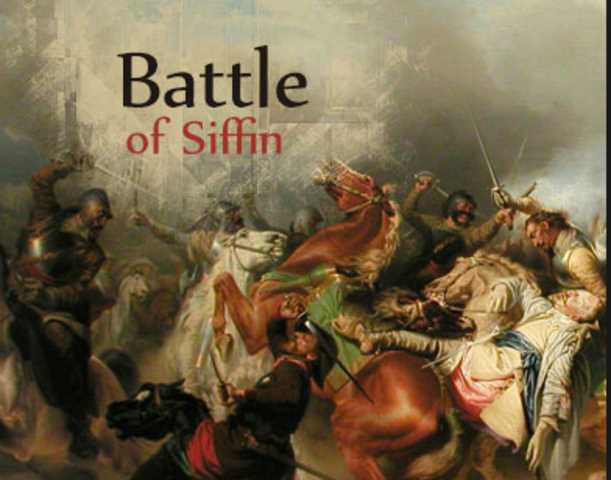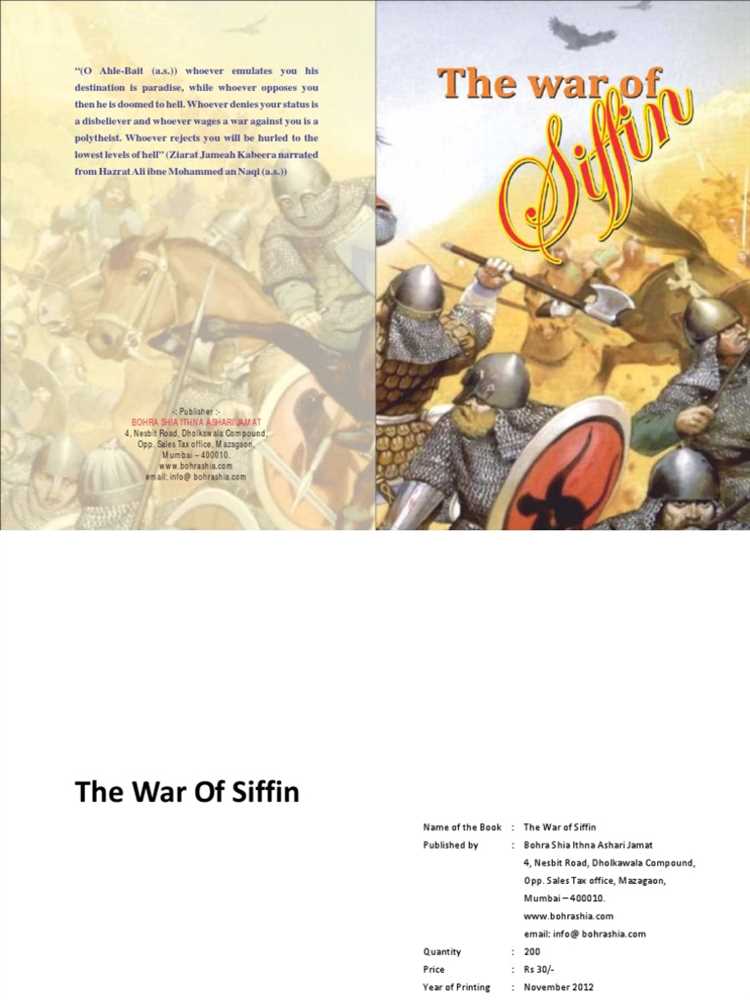The Battle of Siffin is a defining moment in Islamic history, showcasing the unwavering commitment of Hazrat Ali to the values of truth and justice. This epic battle took place in 657 AD between Hazrat Ali and Muawiyah, the governor of Syria, who questioned the legitimacy of Ali’s caliphate.
Hazrat Ali, the cousin and son-in-law of Prophet Muhammad, stood firmly in defense of the truth, refusing to compromise his principles for the sake of power. Despite facing a formidable opponent, Ali remained steadfast in his belief that the caliphate rightfully belonged to him, as he was chosen by the Prophet himself.
As the battle ensued, Hazrat Ali’s troops faced a difficult challenge in not only defending their positions but also maintaining their commitment to justice. Ali emphasized the importance of maintaining ethical conduct, urging his soldiers to adhere to the principles of compassion, mercy, and fairness even in the midst of fierce combat.
“Stand up for justice, even if it is against yourself.”
This famous quote encapsulates Hazrat Ali’s unwavering dedication to righteousness, as he exemplified the teachings of Islam through his actions on the battlefield. Despite the hardships faced by his army, Ali’s determination never wavered, and he refused to compromise his integrity in any way.
The Battle of Siffin serves as a reminder of the importance of standing up for truth and justice, even in the face of adversity. Hazrat Ali’s heroic tale continues to inspire Muslims around the world, as it represents the timeless struggle between good and evil and the unwavering commitment to righteousness.
Hazrat Ali’s Decision to Confront Muawiyah
After the assassination of Hazrat Uthman, the Islamic Caliphate faced a great crisis. Muawiyah, the governor of Syria, refused to pledge allegiance to Hazrat Ali and demanded retribution for the death of Uthman. This refusal led to widespread unrest and division within the Muslim community.
Despite facing immense pressure to seek a peaceful resolution, Hazrat Ali made a courageous decision to confront Muawiyah and bring unity to the Muslim Ummah. He recognized that tolerating rebellion and division would only weaken the Caliphate and undermine the teachings of Islam.
Hazrat Ali firmly believed in justice and truth, and he understood that his duty as a leader was to preserve the integrity of the Islamic state. He knew that by confronting Muawiyah, he would face a formidable opponent who had a significant following in Syria, but he remained steadfast in his resolve.
In order to address the grievances and restore peace, Hazrat Ali dispatched a delegation to Muawiyah, which included prominent companions such as Ammar ibn Yasir and Malik al-Ashtar. However, Muawiyah rejected their proposals and insisted on avenging Uthman’s death.
Realizing that peaceful negotiations were not yielding any results, Hazrat Ali prepared his army to confront Muawiyah in battle. He declared his intentions to his companions, emphasizing the importance of upholding justice and unity in the face of adversity.
Hazrat Ali’s decision to confront Muawiyah was not driven by personal ambition or a thirst for power. It was driven by his unwavering commitment to the principles of Islam. He believed that by standing up for truth and justice, he was fulfilling his role as the rightful successor of Prophet Muhammad.
The Battle of Siffin, which ensued between the armies of Hazrat Ali and Muawiyah, was a defining moment in Islamic history. It lasted for several months and resulted in a stalemate, with neither side gaining a decisive victory.
Although the battle did not result in a conclusive outcome, Hazrat Ali’s decision to confront Muawiyah demonstrated his unwavering determination to uphold the principles of Islam and preserve the unity of the Muslim Ummah. His steadfastness in the face of adversity remains an inspiration for generations to come.
In conclusion, Hazrat Ali’s decision to confront Muawiyah was driven by his commitment to justice and unity within the Muslim community. He understood the grave consequences of division and rebellion and took a courageous stand to preserve the integrity of the Caliphate. Hazrat Ali’s heroic tale serves as a reminder of the vital importance of standing up for truth, even in the face of formidable challenges.
The Battle of Siffin Begins: Clash of Two Great Armies
The Battle of Siffin marked a pivotal moment in the history of Islam. It was a clash between two great armies led by Hazrat Ali, the fourth caliph of Islam, and Muawiyah, the governor of Syria. This battle took place in 657 AD near the banks of the Euphrates River in the region of Siffin, modern-day Syria.
As the two armies assembled on the battlefield, tensions were high. Both sides were determined to settle their differences and assert their authority. Hazrat Ali’s army represented those who believed in the rightful succession of the caliphate, while Muawiyah’s army fought for his claim to power.
The battle began with a series of skirmishes and small-scale engagements. Both sides demonstrated remarkable military tactics and strategic planning. Hazrat Ali’s army showcased their superior skills in close-quarter combat and utilized their strong defensive positions to their advantage. On the other hand, Muawiyah’s army relied heavily on their superior cavalry and long-range archers to weaken Hazrat Ali’s forces.
The battle lasted for several days, during which both armies suffered heavy casualties. The intense fighting and the scorching heat took a toll on the soldiers, testing their endurance and resolve. However, Hazrat Ali stood firmly determined to uphold the truth and justice, leading his army with unwavering courage and conviction.
Despite their efforts, neither side was able to gain a significant advantage over the other. The battle seemed to reach a stalemate as both armies were evenly matched in terms of strength and skill. This prompted both Hazrat Ali and Muawiyah to engage in negotiations in an attempt to resolve the conflict peacefully.
Unfortunately, the negotiations did not yield a satisfactory resolution, and the battle resumed once again. The two armies clashed fiercely, leaving a trail of devastation in their wake. Eventually, the battle concluded without a clear victor, leaving the conflict unresolved.
The Battle of Siffin was a turning point in Islamic history, marking a significant schism within the Muslim community. While it did not provide a definitive resolution, it highlighted the deep divides that existed within the Ummah and laid the groundwork for future conflicts and divisions.
Strategies and Tactics: Ali’s Brilliance in Warfare
In the Battle of Siffin, Hazrat Ali demonstrated remarkable brilliance in warfare through his strategic planning and tactical maneuvers. His leadership and military genius played a significant role in shaping the outcome of the battle.
1. Effective Use of Archers:
Ali strategically positioned archers on the high ground, allowing them to rain down showers of arrows on the enemy forces. This tactic disrupted the enemy’s formations and caused chaos among their ranks.
2. Flanking Maneuvers:
Ali employed flanking maneuvers to surprise and overwhelm the enemy. He led a small contingent of highly skilled soldiers to attack the enemy from the side, effectively splitting their forces and creating confusion among the enemy ranks.
3. Psychological Warfare:
Ali understood the importance of psychological warfare in demoralizing the enemy. He utilized tactics such as launching surprise attacks, displaying superior discipline and bravery, and instilling fear in the hearts of the enemy soldiers.
4. Intelligence Gathering:
Prior to the battle, Ali focused on gathering intelligence about the enemy’s strength, weaknesses, and strategies. This enabled him to plan his own strategies accordingly and exploit the vulnerabilities of the enemy forces.
5. Defensive Fortifications:
Ali strategically fortified his position to withstand the enemy’s attacks. He built trenches and barriers to protect his forces and restrict the enemy’s movements. This allowed his troops to engage in combat from a position of strength.
6. Efficient Use of Cavalry:
Ali’s cavalry played a crucial role in his victory at Siffin. He organized them in a disciplined and coordinated manner, using them to launch swift and decisive attacks on the enemy. The cavalry’s speed and mobility proved to be a significant advantage in the battle.
The battle of Siffin showcased Ali’s brilliance in warfare and his ability to outmaneuver and outwit his opponents. His strategic thinking, tactical maneuvers, and effective leadership were instrumental in securing victory against formidable odds.
The Heroic Stand: Ali’s Resolve Against Overwhelming Odds
On the battleground of Siffin, Hazrat Ali proved to be a shining example of bravery and unwavering determination. Despite facing overwhelming odds, he stood his ground and fought for the truth. This heroic stand showcased his commitment to justice and his refusal to back down in the face of adversity.
As the fourth caliph of Islam, Hazrat Ali was faced with a challenging situation. A group of rebels, led by Muawiya, challenged his authority and refused to recognize his rightful position as the caliph. This led to the famous Battle of Siffin, which would test the strength and resolve of Hazrat Ali and his followers.
Despite being outnumbered and facing a well-equipped army, Hazrat Ali was determined to uphold the truth and maintain justice. He rallied his forces and prepared for a grueling battle. His resolve was bolstered by his unwavering faith in God and his conviction that righteousness would prevail.
The battle commenced, and Hazrat Ali’s troops fought with unparalleled courage. Despite their best efforts, the enemy forces seemed to be gaining the upper hand. But Hazrat Ali remained undeterred. He continued to inspire his soldiers, urging them to fight for the truth and remain steadfast in the face of adversity.
The battle raged on for days, with neither side gaining a clear advantage. The courageous stand of Hazrat Ali and his followers began to draw admiration from both friend and foe. Their unwavering determination and commitment to the truth became a source of inspiration for all who witnessed their bravery.
As the battle intensified, Hazrat Ali’s troops faced numerous hardships. They endured extreme heat, exhaustion, and a shortage of supplies. Despite these challenges, they refused to give up. Their unyielding spirit and unwavering faith guided them through the toughest moments of the battle.
Ultimately, the Battle of Siffin ended in a stalemate, with neither side emerging as the clear victor. While this may have seemed disappointing to some, Hazrat Ali’s heroic stand against overwhelming odds was a testament to his character and unwavering commitment to truth and justice.
Hazrat Ali’s resolve and bravery in the face of such adversity serve as a timeless example for all individuals. His heroic stand at the Battle of Siffin teaches us the importance of staying true to our principles and fighting for what we believe in, even when the odds may seem insurmountable.
| Key Takeaways: |
|---|
| Hazrat Ali’s unwavering determination and bravery – Despite facing overwhelming odds, Hazrat Ali stood his ground and fought for the truth. His resolve and bravery in the face of adversity serve as an inspiration to all. |
| The battle of Siffin as a test of strength and resolve – The battle tested the strength and resolve of Hazrat Ali and his followers. Their unwavering commitment to the truth became a source of inspiration for all who witnessed their bravery. |
| The importance of staying true to one’s principles – Hazrat Ali’s heroic stand teaches us the importance of staying true to our principles and fighting for what we believe in, even when the odds may seem insurmountable. |
The Consequences: The Ongoing Divide in the Muslim Ummah
The Battle of Siffin, with its disputed outcome and the subsequent events, had long-lasting consequences for the Muslim Ummah. The division between the two prominent factions, the followers of Hazrat Ali and those who supported Muawiyah, resulted in a deep schism that continues to affect the Muslim world to this day.
Here are some of the key consequences of the Battle of Siffin:
- Political division: The battle marked the beginning of a significant political division within the Muslim Ummah. This division culminated in the split between the Shia and Sunni sects, as the followers of Hazrat Ali formed the Shia sect, and Muawiyah’s supporters became the foundation of the Sunni sect.
- Doctrinal differences: The Battle of Siffin gave rise to doctrinal differences between the Shia and Sunni sects. The Shia sect believes in the divine right of Ali to the caliphate, considering him the rightful successor of Prophet Muhammad. On the other hand, the Sunni sect follows the concept of consensus (ijma) in choosing the caliph, and they acknowledge the legitimacy of the first four caliphs, including Abu Bakr, Umar, Uthman, and Ali.
- Historical animosity: The Battle of Siffin and its aftermath created a deep-rooted animosity between the two factions. This animosity has persisted throughout history, leading to conflicts and sectarian tensions in various parts of the Muslim world.
- Geographical divisions: The division between the Sunni and Shia sects has resulted in geographically distinct regions where each sect has a majority. This can be seen in countries like Iran, Iraq, Bahrain, and Lebanon, where Shiite populations are significant, while Sunni populations dominate in countries like Saudi Arabia, Pakistan, and Egypt.
- Political instability: The ongoing divide between the Sunni and Shia sects has contributed to political instability in several Muslim-majority countries. Conflicts, insurgencies, and power struggles can often be traced back to these sectarian tensions.
In conclusion, the Battle of Siffin and its aftermath had profound consequences for the Muslim Ummah. The division between the followers of Hazrat Ali and those who supported Muawiyah led to a schism that continues to shape the Muslim world today. The political, doctrinal, historical, and geographical divisions, along with the resulting animosity and political instability, are all consequences that stem from this pivotal moment in Islamic history.
Legacy of the Battle: Lessons Learned from Hazrat Ali’s Courage
Hazrat Ali’s stand for truth during the Battle of Siffin left an indelible legacy that continues to inspire and provide valuable lessons even today. His unwavering courage and dedication to justice serve as a shining example for individuals of all backgrounds. Below are some key lessons that can be learned from Hazrat Ali’s heroic tale:
- Commitment to Truth: Hazrat Ali’s steadfast commitment to truth demonstrates the importance of standing up for what is right, regardless of the circumstances. His refusal to compromise his principles or waver in the face of adversity serves as a reminder that truth should never be compromised.
- Leadership: The Battle of Siffin showcases Hazrat Ali’s exceptional leadership skills. His ability to rally his troops and maintain unity in the face of opposition highlights the qualities of a great leader. His leadership style, based on justice and consultation, teaches the importance of fair decision-making and inclusivity.
- Character and Morality: Hazrat Ali’s actions during the battle exemplify his high moral character. His humility, kindness, and patience even in the midst of conflict set a powerful example for individuals to follow. His unwavering commitment to justice and mercy teaches the importance of moral integrity in all aspects of life.
- Importance of Unity: Hazrat Ali’s efforts to maintain unity among his followers despite differences highlights the significance of unity within the Muslim community. The Battle of Siffin emphasizes the need to put aside personal disagreements and work together towards a common goal, promoting harmony and cooperation.
- Perseverance in the Face of Challenges: Hazrat Ali’s resilience and determination during the Battle of Siffin demonstrate the importance of perseverance in the face of challenges. Despite the hardships and betrayals he faced, he remained steadfast and committed to his cause, teaching the value of persistence in achieving one’s goals.
In conclusion, the legacy of the Battle of Siffin and Hazrat Ali’s courageous stand for truth continues to resonate through the ages. His unwavering commitment to justice, exemplary leadership, moral character, emphasis on unity, and perseverance serve as timeless lessons for individuals seeking inspiration and guidance in their own lives.
FAQ:
What was the Battle of Siffin?
The Battle of Siffin was a significant battle fought between the forces of Hazrat Ali, the fourth caliph of Islam, and Muawiyah, the governor of Syria, in 657 AD.
Why did Hazrat Ali fight in the Battle of Siffin?
Hazrat Ali fought in the Battle of Siffin to defend the principles of justice and truth and to maintain the legitimacy of his leadership as the caliph.
Who were the main leaders in the Battle of Siffin?
The main leaders in the Battle of Siffin were Hazrat Ali and Muawiyah.
What were the consequences of the Battle of Siffin?
The Battle of Siffin resulted in a stalemate and led to the division of Muslims into two factions, the Kharijites and the Shiites. It also weakened the authority of the caliphate.
How did Hazrat Ali’s stand for truth inspire others?
Hazrat Ali’s stand for truth inspired others by setting an example of unwavering faith, courage, and commitment to principles. His willingness to stand up against corruption and injustice resonated with many and continues to inspire people to this day.
What were the main challenges faced by Hazrat Ali in the Battle of Siffin?
The main challenges faced by Hazrat Ali in the Battle of Siffin included the betrayal of some of his own troops, accusations of attempting to negotiate a settlement against his principles, and the use of deceit and trickery by the opposing forces.
How did the Battle of Siffin impact the future of Islam?
The Battle of Siffin had a significant impact on the future of Islam as it led to the rise of sectarian divisions within the Muslim community. The division between the Sunnis and the Shiites can be traced back to this battle.


